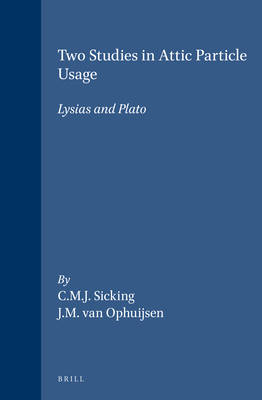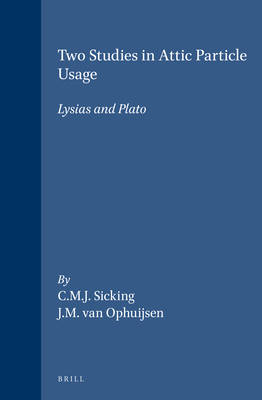
- Afhalen na 1 uur in een winkel met voorraad
- Gratis thuislevering in België vanaf € 30
- Ruim aanbod met 7 miljoen producten
- Afhalen na 1 uur in een winkel met voorraad
- Gratis thuislevering in België vanaf € 30
- Ruim aanbod met 7 miljoen producten
Zoeken
€ 216,95
+ 433 punten
Omschrijving
In the first part C.M.J. Sicking - by using two speeches by Lysias - discusses the articulation of the text by devices marking the beginning of sentences. A separate index offers some considerations bearing on the value and use of (1) five so-called 'interactive' particles and (2) some particles found in interrogative sentences.
In the second part J.M. van Ophuijsen deals with ουν, ྄ρα, δῄ and τοίνυν, all of them traditionally regarded as 'inferential' particles. The discussion focuses on, but is not restricted to, Plato's Phaedo. There is an 'excursus' on ྄ρα in Herodotus.
Both authors have adopted a deliberately eclectic approach, taking advantage of what modern linguistic research has to offer without at the same time neglecting what many generations of scholars from Hoogeveen to Denniston have contributed to our understanding of ancient Greek.
In the second part J.M. van Ophuijsen deals with ουν, ྄ρα, δῄ and τοίνυν, all of them traditionally regarded as 'inferential' particles. The discussion focuses on, but is not restricted to, Plato's Phaedo. There is an 'excursus' on ྄ρα in Herodotus.
Both authors have adopted a deliberately eclectic approach, taking advantage of what modern linguistic research has to offer without at the same time neglecting what many generations of scholars from Hoogeveen to Denniston have contributed to our understanding of ancient Greek.
Specificaties
Betrokkenen
- Auteur(s):
- Uitgeverij:
Inhoud
- Aantal bladzijden:
- 192
- Taal:
- Engels
- Reeks:
- Reeksnummer:
- nr. 129
Eigenschappen
- Productcode (EAN):
- 9789004098671
- Verschijningsdatum:
- 1/04/1993
- Uitvoering:
- Hardcover
- Formaat:
- Genaaid
- Afmetingen:
- 165 mm x 244 mm
- Gewicht:
- 476 g

Alleen bij Standaard Boekhandel
+ 433 punten op je klantenkaart van Standaard Boekhandel
Beoordelingen
We publiceren alleen reviews die voldoen aan de voorwaarden voor reviews. Bekijk onze voorwaarden voor reviews.








